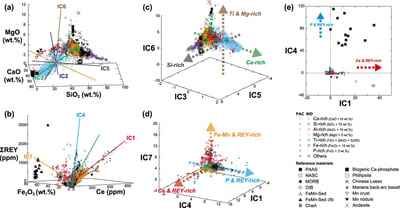Authors
Kazutaka Yasukawa, Kentaro Nakamura, Koichiro Fujinaga, Hikaru Iwamori & Yasuhiro Kato
Abstract
Deep-sea sediments have attracted much attention as a promising resource for rare-earth elements and yttrium (REY). In this study, we show statistically independent components characterising REY-enrichment in the abyssal ocean that are decoded by Independent Component Analysis of a multi-elemental dataset of 3,968 bulk sediment samples from 101 sites in the Pacific and Indian oceans. This study for the first time reconstructs the spatiotemporal variations of the geochemical signatures, including hydrothermal, hydrogenous, and biogenic calcium phosphate components that were closely involved in the formation of REY-rich mud over the past 65 million years. An underlying key factor of significant REY-enrichment is a sufficiently low sedimentation rate that enables the mud to accumulate REY from seawater. In the early Cenozoic, a remarkably small supply of aeolian dust, compared with any other time and region, facilitated the deposition of very high-grade REY-rich mud in the South Pacific. This indicates an important link between the genesis of the seafloor mineral resources and Earth’s dynamic phenomena such as climate change and plate tectonics.

Scientific Reports URL: http://www.nature.com/articles/srep29603